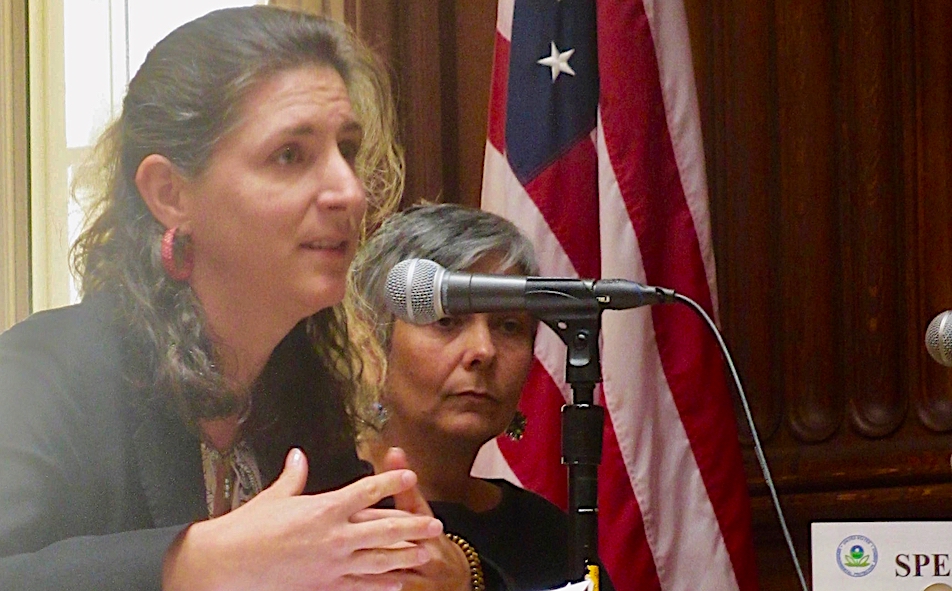
Stephanie Thomas offers testimony to the U.S. Environmental Protection Agency
One of several articles Texas Climate News is publishing to mark the first anniversary of Hurricane Harvey.
+++
In an effort to gauge whether the catastrophic storm has shifted attitudes about climate change in Houston, Texas Climate News editor Bill Dawson posed the following questions to several knowledgeable Houstonians:
- A year on, do you think Harvey has notably changed attitudes on climate change in Houston — either among leaders and other influential people or among the population as a whole? Among some, but not others?
- If so, can you provide some key examples and what effects the attitude shift may have, moving forward?
- If you don’t think attitudes toward climate change have moved much, even after such a catastrophic weather event, why do you think that is?
Here is the response from Stephanie Thomas, Houston-based staff member of Public Citizen, a nonprofit consumer advocacy group founded by Ralph Nader in 1971.
Thomas has been a leader in efforts to push the city of Houston to develop a municipal Climate Action Plan through the Houston Climate Movement coalition, so we posed an additional question to her alone:
Do you think Harvey helped influence Houston officials’ decision to launch the process toward a Climate Action Plan, as you’ve been urging them to do?
+++
[In answer to the first question about whether Harvey changed Houston attitudes on climate change:]
Yes but only somewhat. Harvey reinforced what people who have been on board with climate change have already known, but it has also gotten some new folks wondering a little louder about climate change impacts.
That said, there are still many people among the general public and in power who have written Harvey off as a freak storm exacerbated by Houston’s low-lying character.
However, others are starting to say something more about climate change. While Harris County Judge Ed Emmett didn’t much mention climate change at the Climate Change Town Hall on Aug. 18, he spoke about it in an interview with [blogger] Charles Kuffner on the [Harris County] bond election [in which voters approved $2.5 billion for flood-control projects on Aug. 26]. He doesn’t come out and say climate change is the result of emissions from fossil fuels, but he concedes there are things that are happening. His point of reference wasn’t Houston but rather Glacier National Park.
We also saw that at the Houston City Council meeting on Aug. 14 when the Houston Climate Movement spoke. Council Member Michael Kubosh described his recent vacation to Lake Mead and the incredibly low lake levels he observed. He didn’t connect the dots directly to Houston, and certainly didn’t tie climate change to emissions, but he expressed a concern that climate change could be impacting this country.
Moody’s released a report last fall that may be having some impact. [The credit-rating agency said a city’s “exposure to climate shocks and its resilience to this vulnerability is an increasingly important part of our credit analysis, and one that will take on even greater significance as climate change continues.”]
For those in our political leadership who still deny climate change, Harvey didn’t win them over because there are a lot of things that Harvey can be blamed on: the high pressure system that prevented Harvey from moving northward, development practices that have created runoff, faulty dams, etc.
All of that can be true, and that does not deny the impact of climate change on Harvey. Harvey was the largest rainfall event in North American on record, and that a large amount of precipitation would not have been available in the absence of human-induced global warming.
Assuming that folks are genuine in their disavowal of climate change, here are my observations about why:
- Their colleagues, friends, family members, etc. deny climate change.
- They have confused the distinction between weather and climate – “The weatherman can’t even predict accurately what will happen tomorrow, how can anyone predict what will happen years from now?”
- They are challenged in connecting the dots and allowing for multiple causes of flooding.
- They are unable to link greenhouse gases to climate change, to link cause and effect.
- They subscribe to conspiracy theories around the motivations behind climate action.
- They believe hold a belief that the actions of human beings are too small to impact the entire world.
- They have a strong interest in oil and gas and are unwilling to see O&G as a culprit.
[As for whether Harvey influenced Houston officials’ decision to launch the process toward developing a Climate Action Plan:]
Yes, Harvey absolutely helped influence Houston officials’ decision to launch a climate action planning process.
When I first spoke at Council in May 2017 regarding a Houston Climate Action Plan (CAP), I was met with a sense of reluctance. Even if the city wanted to create a CAP, doing so would cost money that the city didn’t have. The Houston Climate Movement began to brainstorm on how it might support the CAP planning efforts – doling out work among its members, for example, or perhaps even helping to raise funds for a plan. We really wanted to see Houston create a CAP.
After Harvey, things began to shift. I didn’t expect city officials to start the planning process while they were in full-out Harvey recovery mode, but I was happy to hear them talk about the possibility. After the Moody’s climate change report was released in November, the city openly spoke about moving forward on a CAP. Now the city has “softly” announced the CAP, first at Earth Day and then on its website and at the Aug. 18 Climate Change Town Hall. I expect to hear more from the city soon. We are glad to see the city of Houston moving in this direction.
+++++
